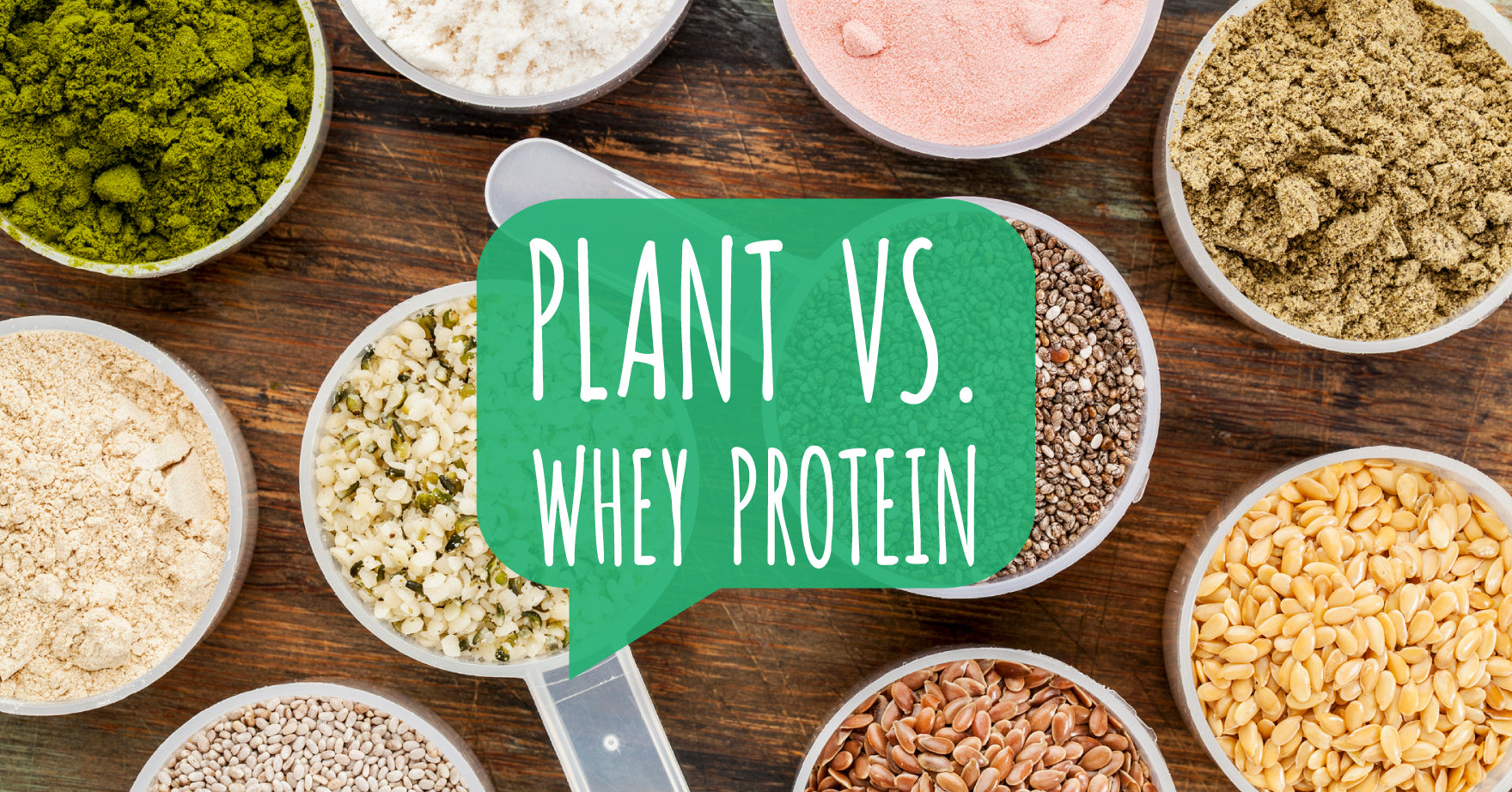Plant Protein vs. Whey Protein

What is Whey Protein?
Whey protein is a by-product of cheese. When milk is turned into cheese, one of its proteins, whey, is separated out. This whey is then turned into powder that you can use in smoothies and shakes.
What is Plant Protein?
Plant protein is what the name suggests – protein that is made from plants. There are no animal products used when making plant protein. Plant protein can come from a variety of plants, including pea, hemp, sunflower, and rice.
Advantages of Plant Protein
Plant protein is ideal for vegans because there are no animal products used in its creation. It also contains no dairy, so those who are lactose-intolerant can enjoy it. Plant proteins also include more nutrients than whey protein because the source plants provide additional minerals like fiber and iron. Research has also shown that plant protein can increase muscle thickness. This is great if you are new to weight lifting and want to increase your muscle strength quickly.
Disadvantages of Whey Protein
Whey protein is incredibly popular, but it is not without its disadvantages. Let’s take a closer look at the side-effects you may experience from eating whey protein.
Digestive Issues
Consuming too much whey can cause gastrointestinal problems. This is because there is so much protein in whey that your body has trouble digesting and absorbing it. You may experience diarrhea, bloating, and cramps when you consume whey protein. Occasionally, whey protein can cause constipation as well.
Lactose Absorption
Lactose is the main carbohydrate in whey. This means those who are lactose intolerant should not consume it. Lactose intolerance is when your body is missing the enzyme lactase and is unable to process lactose. Lactose intolerance is incredibly common. Almost 75% of people are lactose intolerant. Even if you have the enzyme lactase, you can still be sensitive to lactose and may experience side effects when you consume it. Symptoms of lactose intolerance include diarrhea, gas, and bloating.
Increased Insulin Production
Whey causes your body to produce a large amount of insulin when you consume it. It also increases the production of GIP and GLP-1, two gastrointestinal hormones that raise insulin levels. Research has found that whey protein causes a larger increase of these hormones than white bread, a known cause of large insulin spikes. Also, including whey in your meals stimulates an insulin response, even though it is a protein. If you have elevated insulin production for too long, then your chances of becoming insulin resistant increases. Those who are insulin resistant are considered pre-diabetic and have an increased risk of developing type 2 diabetes.
Skin Inflammation
Whey protein can cause serious issues for your skin. Since whey is made from milk, it is a dairy product, even if you may not think of it that way. Milk products can cause acne because they increase a hormone called insulin factor growth-1 (IGF-1). While IGF-1 can support muscle growth, it also increases production of sebum. Sebum is an oil that blocks glands and causes acne. Research has also shown that when people cut whey protein from their diet, their acne breakouts stopped. You may find that your skin will clear up after a few weeks of cutting dairy product like whey out of your diet!
Plant Protein is Best
Plant protein is the best type of protein powder to use because it doesn’t cause any of the side effects of whey protein. When you eat plant protein, you won’t have digestive issues, skin issues, or an increase in insulin production. Plant protein is also easy on your stomach and can be absorbed quickly and efficiently by your body. This means no bloating or constipation.
Since there are so many plant protein powders available, be sure to do your research before you purchase. Always choose certified organic products that exceed the health standards put out by world health organizations. When you choose plant protein, you’ll not only be choosing the best source of protein, but you’ll also build muscle and look and feel your best.
Also in Featured Articles

Cross Training Improves Fitness and Reduces Injury
You may be in great shape, for the sort of exercise you do routinely. But if that's all you do, day after day, you may be setting yourself up for injury or mental burnout, and that is not a good way to get fit. What can help prevent injury and burnout? Cross training.

7 Nutrition Hacks for Elite Performance You’ve Never Tried Before
As athletes progress toward higher levels of competition and training, nutrition plays a much bigger role in their ability to perform and recover. Aside from simply receiving adequate caloric intake, there are other roles nutrition plays and systems that it influences.

Exercise helps inhibit cancer - Breakthrough study reveals how
Exercise affects almost all tissues in the body, and scientists have found that being physically active can reduce the risk of several types of cancer as well as improving outcomes for cancer patients.

